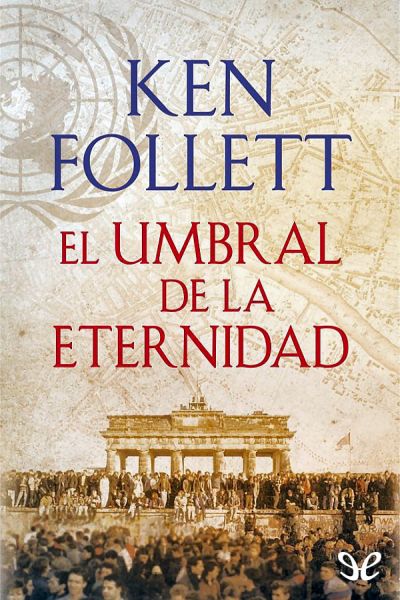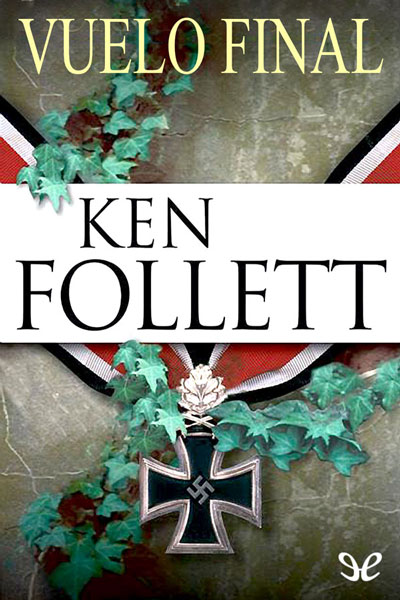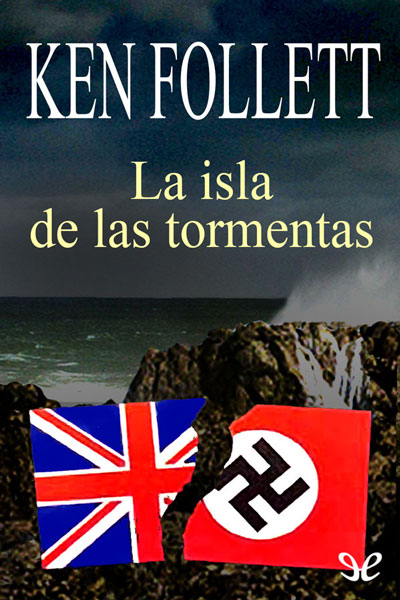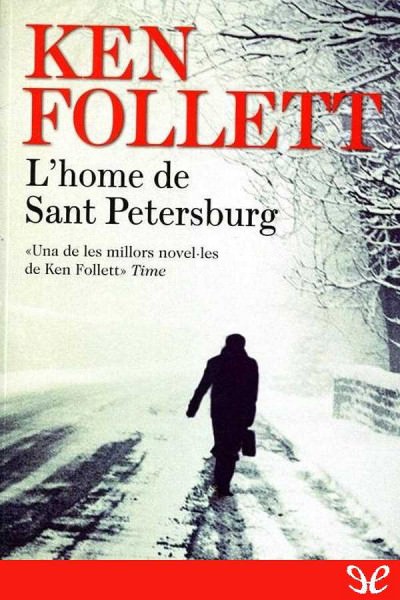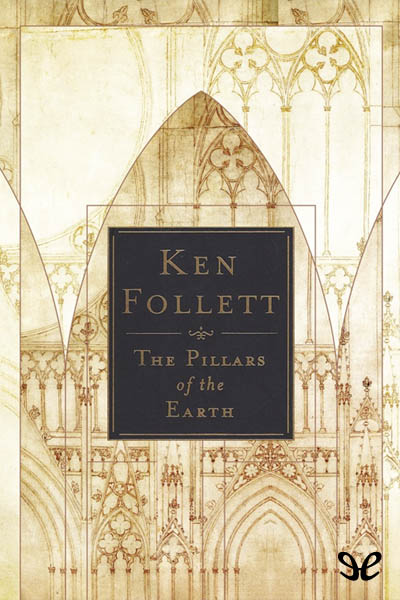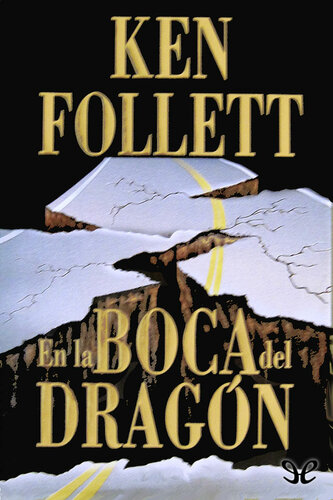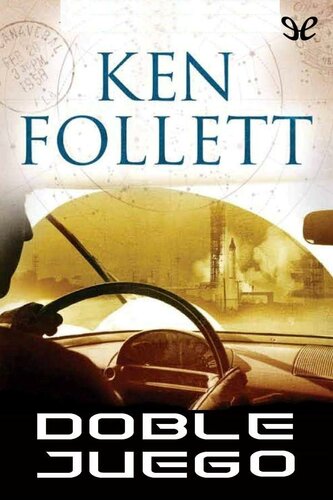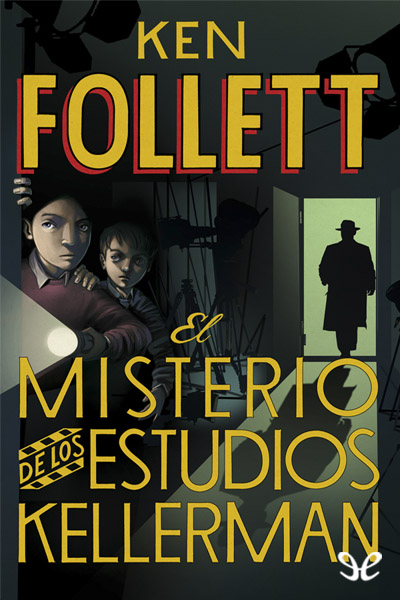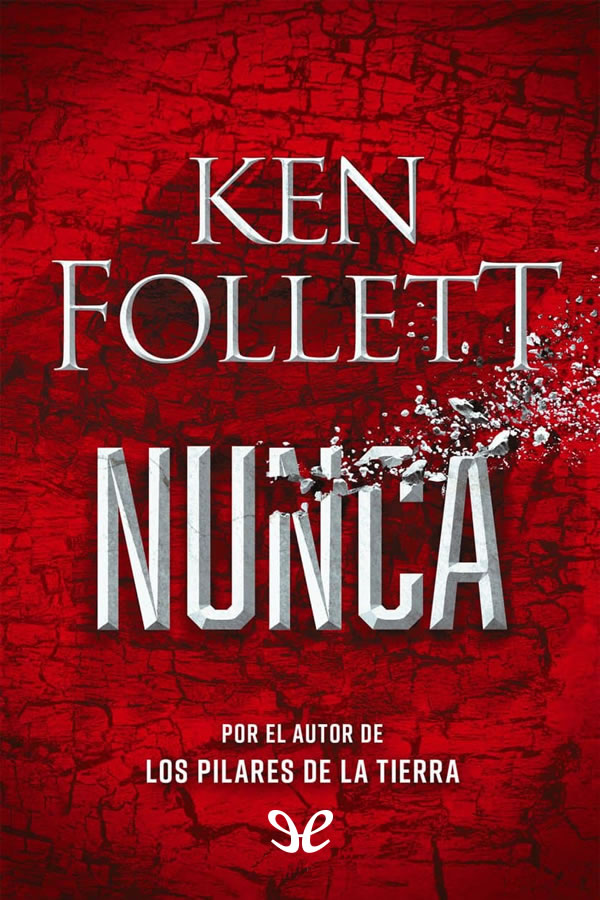oleebook.com
La caiguda dels gegants de Ken Follett
de Ken Follett - Género: Histórico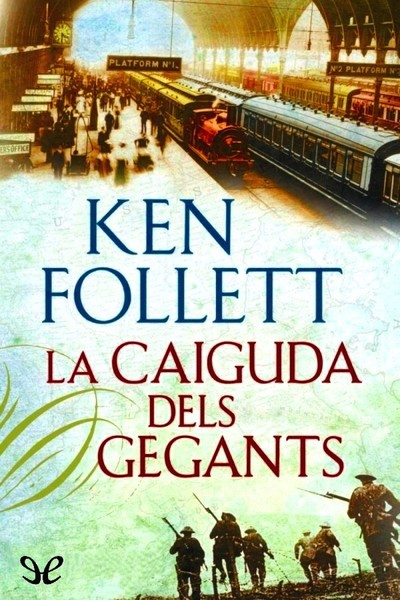
Sinopsis
La història comença el 1911, el dia de la coronació del rei Jordi V a labadia de Westminster. El destí dels Williams, una família minera de Gal·les, està unit per lamor i lenemistat al dels Fitzherbert, aristòcrates i propietaris de les mines. Lady Maud Fitzherbert senamorarà de Walter von Ulrich, un jove espia a lambaixada alemanya a Londres. Les seves vides sentrellaçaran amb la dun assessor progressista del president dels Estats Units, Woodrow Wilson, i les de dos germans russos als quals la guerra i la revolució han arrabassat el somni de buscar fortuna a Amèrica.
Des de Washington fins a Sant Petersburg, des de la immundícia i els perills de les mines de carbó fins als luxosos canelobres dels palaus aristocràtics, passant pels passadissos de la Casa Blanca i el Parlament de Westminster, Ken Follett ens ofereix, en la seva novel·la més ambiciosa, lacurat retrat duna època i de les passions que van sacsejar la vida dels seus personatges.
És la primera novel·la de la trilogia «The Century», que continua amb Lhivern del món.
Libros Recomendados - Relacionados
Reseñas Varias sobre este libro
It's a little disappointing that people are rating this book on Amazon out of protest of its price. It's low rating does not give the book the recognition it deserves. This is my first Ken Follett novel, and I am hooked. I've read where some people have not been that interested in the subject matter of Fall of Giants and prefer the Middle Ages. I'm fascinated with 20th Century history, so this is right down my alley.
This novel covers the years of WWI and the Russian Revolution and follows 5 families. Their stories all connect at some point. While you invest in the characters, the story is plot driven and moves pretty swiftly through the years. There are times that a character may be left for a year before we hear from him again. But you don't feel you're missing any crucial information.
My favorite portions were before and after the war. There is quite a bit of battlefield sections in the middle. They are well written, but I am more interested in the people than military tactics.
I was surprised at how quickly this book reads. Despite it's huge size, you can read it pretty quickly if you have the time to devote to it.
I thoroughly enjoyed this.
My Review of Winter of the World20th-century epic family-saga ...more645 s1 comment Matt970 29.2k
Men were the only animals that slaughtered their own kind by the million, and turned the landscape into a waste of shell craters and barbed wire. Perhaps the human race would wipe itself out completely, and leave the world to the birds and trees Perhaps that would be for the best
- Ken Follett, Fall of Giants
This book is utter trash.
Is that too harsh? Let me rephrase.
This book is a steaming pile of garbage.
Still a bit mean?
It doesnt matter. Ken Follett does not give a whit. His editor and publisher do not care. His accountant certainly is indifferent to this complaint.
Its not that Ken Follett is critic proof, because that implies that he achieves astronomical sales figures despite scathing . Thats not the case. Rather, he achieves those astronomical sales with the apathetic approbation of critics usually quick to slash and burn.
Ken Follett cannot be criticized. He is covered in Teflon, Kevlar, and Valyrian steel. Book reviewers understand this and have given up.
Still, it needs to be said. This book is awful. And I dont care that Ken Follett cant hear me because his ear canals are plugged with diamonds.
Moving on.
Let us start with what Ken Follett is not. He is not a poet. He is not a short story writer. He does not craft literary fiction. He doesnt even do thrillers anymore. Instead, Ken Follett writes dumbbell-sized works of historical fiction that manage to be simultaneously prodigiously researched and absolutely inauthentic.
What is Ken Follett? Ken Follett is a wizard. He is an alchemist. He takes magic beans, plants them in fallow earth, and grows trees that shed money. He turns charcoal into diamonds, iron into gold; he sleeps in a room built from emeralds, and blows his nose in the finest silk. His ingredients are horrible characters, lack of psychological insight, lumbering plots, and striking coincidences. He mixes all these into 1,000 pages and creates a bestseller.
Ken Follett has entered into a dark pact. Im sure of it.
To be fair, Fall of Giants does not aspire to be great, National Book Award-contending literary fiction. Ken Follett does not want to be Jonathan Franzen; he doesn't even want to be John Jakes.
There isn't a very high bar for this kind of book. Unfortunately, I cant imagine any bar that Fall of Giants actually hurdles. Its not good fiction, its not good literary historical fiction (ala War and Peace), and its not good historical fiction. Ken Follett makes Herman Wouk read Proust, and Terry C. Johnson appear as Dostoyevsky.
Fall of Giants is the first in a proposed Century Trilogy. It is an ambitious undertaking, Ill grant, and Id be far more excited if a different authors name was above the lame, innocuous title. Instead, there are at least 2,000 more pages of inanities to come. [Cue Ken Folletts accountant planning a new addition to his house].
The plot of the first installment is easily summarized: its World War I.
Literally.
The historical realities dictate everything that happens in this novel. Follett has taken the historical timeline and plugged it with so-called characters meant to give real-life events human-sized drama. You will find more drama, however, on any Wikipedia page.
Not that Follett isnt straining for drama. He certainly is. As the excerpt up top shows, he wants us to know that this big book is important.
These turbulent years somehow made exceedingly boring with Folletts paralyzing touch are viewed through the eyes of five interrelated families. It would be a stretch to call these characters archetypes. The words cardboard cutout, tired clichés, and hopelessly derivative are much more apt. Nothing happens or unfolds or is said that hasnt happened, unfolded, or been said better in other books or movies. There is no wit, warmth, or ingenuity to be found. The only surprise is that Follett does exactly what you expect him to, every single time.
Take, for instance, Earl Fitzherbert, the English Lord of the Manor. Take a wild guess what hes . Conservative. Check. Insufferable. Check. Against suffrage. Check. Sleeping with his maid. Check.
You might not believe it, but theres also star-crossed lovers! Yes, I know, you didnt think hed pull the whole German man in love with a British woman bit (so daring!). But this is Follett. He does it. And if you also surmised that this German man will be suspiciously anti-imperial (no spiked helmet or pointy mustache here!), you are also on the money.
Or what about the Williams family? Theyre Welsh. Theyre coalminers. As though in Folletts world there is a difference. Also, you know theyre Welsh because the son, Billy, calls his dad Da. I stand in awe of the research it must have taken to uncover that nugget of detail.
The use of Da and Dai is the extent of the Welsh idioms employed by the Williams family. It is the extent of the use of any idioms, really. Every character, whether English or Welsh or Russian or American or German speaks in the exact same way: unconvincingly. That is, they converse in robotic monotones meant to deliver historical exposition to keep us moving down the timeline toward the sequel. There is never a moment when two characters share original thoughts, insights, or profundities. I found no evidence, on the basis of the many interactions and conversations that occur, that anyone in this novel is a human being.
Take, for instance, an exchange between Gus and Rosa. Gus works for President Wilson. He wont let you forget about that, because its all he talks about. He also has a big head. Rosa has one eye. That is the extent of their characterizations:
Im sorry, [Rosa] said. For you, for me, for the world. She paused, then said: What will you do?
Id to join a Washington law firm specializing in international law. Ive got some relevant experience, after all.
I should think theyll be lining up to offer you a job. And perhaps some future president will want your help.
He smiled. Sometimes she had an unrealistically high opinion of him. And what about you?
I love what Im doing. I hope I can carry on covering the White House.
Would you to have children?
Yes!
So would I I just hope Wilson is wrong about them He says they will have to fight another world war.
God forbid, Rosa said fervently.
God forbid, indeed. SPOILER ALERT. Gus and Rosas big-headed one-eyed children will have to fight another world war. If theres a more awkward and clumsy way to set up the next book, I frankly really, really, really want to read it. For humors sake.
Everything about Folletts recreated world seems fake. Its a studio back-lot for a western movie: everything is a façade, with no actual dimensions. Every location, from England to Germany to Russia to the United States feels exactly the same.
Folletts research is a facile gilding. In Pillars of the Earth and World Without End, Follett demonstrated his inability to create memorable personages or write convincing dialogue. Yet he also did a marvelous job cramming period-specific detail into the story. I still shudder to think about medieval bread, thanks to Folletts meticulous recounting of how it was made. Nothing that level of detail is present here. Instead, famous events are often passed off in the form of exposition. Towards the end of the novel, there is a nice little scene showing rampant inflation in postwar Germany. This small, intimate, anecdotal moment, shows Follett at his best, working his research into his larger story. Mostly, though, things Gallienis Taxis of the Marne and the rise of Lenin and Trotsky come through in clunky dialogues.
Historical fiction gives you the chance to breathe new life into actual people. Follett decides to ignore this opportunity completely. Despite walk-on roles by dozens of famous people, none of them is given even the hint of a spark. I'm not asking for something along the lines of Tolstoy's creative realization of Napoleon. But you have to do more than simply mention Sir Edward Grey's name and expect me to swoon at the verisimilitude.
One of the odder things Ive noticed about Follett is his inability to write a big set piece. His earlier work (Eye of the Needle, Night Over Water) showed him to be a precise plotter of containable dramas. Since hes expanded his tableaus, however, he has lost his sure grip. I compare it to a movie director Kevin Smith (director of small budget, dialogue-centric films) directing a big action movie. Follett just cant do it. His battle scenes are silly and empty and fake. His big Russian Revolution moments are a confusing mess.
And dont even get me started on the bad sex scenes. Theres only one! I used to be able to count on Follett to prepare three or four euphemism-free adult encounters that would leave me searching for a bottle of wine and a pack of cigs. Not here. As Follett has reached his widest audiences yet, he seems to have toned down his erotic impulses. All we get is a handjob during an opera. Thats a shame.
Perhaps the only interesting thing about this novel is its unusual political undercurrents. Generally, I think most people still hew to the Germans-were-the-aggressors-and-the-Allies-were-the-heroes line of World War I. (That casting is one of the consequences for Germany's actions in World War II). Follett takes a different tact, lingering on Great Britain's questionable decision to enter the war. His recollections of Unions and workers revolutions is also generally favorable, though I doubt the masses realize they are reading their fake-history with a leftist slant. (This is not a political hot-take. The slant isnt bothersome, its just interesting. Rather, it would have been interesting in a more lively, well-written, coherent novel).
This has been a rather negative review, so I will say two nice things:
First, I appreciate that Follett always tries to find actual roles for his women. They are just as poorly-realized and one-dimensional (half-dimensional?) as everyone else, but theyre never window dressing.
Second, Folletts books go down easy. I think they are horrible in every objective, measurable way. Despite this, they are also fun to read. To me, the horribleness is even a bit endearing. Heck, another extremely graphic sex scene or two, and this mightve earned another star.
And theres no way Im missing the sequel.
(EDIT: It has been many years, dear reader, and time has flowed on down the river. It now occurs to me that there is every possibility that I am missing the sequel. Life is just too short to read huge novels due solely to their unintentional hilarity).historical-fiction361 s Melissa Rochelle1,280 152
One of the early I read stated that this book lacked one of Follett's infamous villains. I disagree. The ultimate villain in this enormous book is clearly war and perhaps the arrogance of world leaders.
I've always had a difficult time understanding the why surrounding World War 1 and this book helps put it in perspective (even if it is fiction). I remember learning in history class that the US got involved because the Germans torpedoed the Lusitania. And it did play a part, but that happened in 1915 and the US didn't declare war on Germany until late-1917/early-1918. I STILL don't understand why Germany got all the blame...wasn't it the Austria-Hungary Empire that started the war for NOT backing down to a fight with Serbia?! Obviously, WW1 was fought because a bunch of arrogant world leaders didn't want to look weak. Looking back, they all look spineless jerks that killed millions of people because they wanted to "rule the world". By destroying the German economic system after all the fighting was done, they helped Hitler gain power and kill millions more in WW2. Way to go early-20th century world leaders...thanks for all the memories.
I really enjoyed this book and think it's worth it for everyone to read! While the beginning was a little slow (primarily because of all the character introduction required), it picked up speed and was difficult to put down (despite how heavy it was)!
If you d this, try John Jakes' North and South trilogy. I really think that Fall of Giants is for the 20th century what North and South was for the Civil War.
Review of Book 2: Winter of the World
historical-fiction288 s Mohammed Arabey709 6,085
?????? ??? ????? ?? ?? ???? ????????????????? ???????? ???????? ?? ????? ???
????? ?? ????? ???? ??? ????????? ???????? ??????? ????????? ?? ????? ?????? ??????? ??????
?????? ????? ??????? ???? ????? ?????? ???? ?????? ???????? ??????? ????? ???????? ???????
?????? ???????? ???????? ??????? ?????? ??????? ????? ????? ????? ??????? ?????????? ????? ??????
?????? ??????? ????? ???????? ???? ?? ???? ??? ?? ??..?? ??? ?? ????? ??? ???????? ??????
??????? ?????? ?????? ??????? ?????? ???????? ???? ????? ?? ?????? ??????? ?????? ?????
?????? ???????? ?? ??????? ?? ??? ???????..?????????? ?? ??? ???????
?? ???? ??? ????????
????? ???????? ?????? ???? ????? ???????? ???? ?????? ? ????? ??????? ???? ??????
???? ?????? ????? ???? ??? ????? ????? ????? ???????? ????????? ??????????? ????????? ???????? ????? ??? ?????
??? ????? ???????? ????? ????? ?????? ???????? ?? ??????...??? ?? ?????
????? ?????? ???????..???? ???? ??? ??????? ??? ? ???? ? ???. ..??? ????? ?? ?????? ??????? ????
?????? ????? ??????? ??? ??????? , ??????? , ????? ?????? ??????? ?????? ????? ?????? ?? ??? ??? ????
??? ?????? ??????? ?????? ??? ?????? ????? ????? ??????? ????? ??? ???? ?? ????? ??? ?????? ????????
?? ??? ?????? ? ????? ?? ????? ?????? ?? ????? ??????? ?? ???? ????????? ??????? ???????? ????? ???????
?????? ??? ???? ??? ??????? ?????? ... ??? ??? ????? ???????? ????????
??? ???? ??? ????? ???????????...??? ???? ????? ??? ???? ?????? ????? ????
?????? ?? ????? ?????? ? ?????? ?????? ???????? ??? ???? ????? ?????? ???? ??????? ????? ??????? ??????????? ????? ????? ??????? ??????? ???? ?????,???? ?????, ??????
???????? ??? ?????? ?????? ?????? ? ?????? ??????? ????? ?????? ? ???? ????? ???? ??????? ????????? ???????? ? ????? ? ????? ? ???? ???? ????? ? ??????
?? ??? ?? ?????? ???? ?? ??? ???????? ? ?????? ????? ???????
****************************
???? ????? ????? ??? ?? ???? ?????? ??????? ?? ????? ??????? ?? ???? ?????? ?? ????? ???????? ????? ??? ???? ?????? ????? ?????? ????? ?? ?????? ????? ?? ??????? ????? ? ?????? ???????? ??????? ???? ???? ???? ???? ?? ??????? ?? ?????? ????? ??????
??? ????? ??? ????? ??? ?? ???? ????? ?????? ???? ?? ????? ??? ????? ?????? ??????? ? ?? ????? ????? ?? ???? ??? ?? ????? ??? ????? ?????? ???? ????? ???????? ???????? ?? ??????? ?????????? ?????? ??? ???? ???
And I have to admit that I only got this box set as a deal price on amazon just cause it's looks pretty elegant, and I'm a collector as you may know..
???? ??? ??? ????? ??? ??????? ???? ?? ?????? ????? ?????? ???????? ????????? ?????? ???? ?? ?????? ??? ??? ????? ?????? ??????? ?????? ???????
???????? ?????? ?????? -??? ??????? ????- ???? ??? ??????? ????????? ??????? ?? ??? ?? ????? ?? ????? ?????? ???? ?? ???? ?? ??????? ?? ????? ? ??? ?? ??????? ?? ??? ????? ????? ?? ??????? ???? ????? ???????? ????? ????
????? ?? ???? ?? ???????? ???? ?? ????? ???????
???????? ????? ???????? ?????? ????? ??? ????? ???? ????? ???? ? ??? ?????? ??? ?? ?????? ????? ???????? ? ???? ???????? ???????....?????? ????? ????? ???????? ?????? ???? ????? ????? ?????? ????
?????? ???????? ????? ??? ???????? ??? ?????? ??? ???????? ???? ? ????????? ???????? ???????? ??? ?????? ?????...??? ??? ????? ??? ????? ?? ??????? ????????
-??? ??? ?????? ??? ??????? ?? ?????? ??? ???? ??? ??? ?????? ???????? ?? ???? ?? ????? ??? ?? ?? ???????? ?????? ???????? ?????? ?? ??? ??????? ? ??? ?? ???????? ?????? ??????? ???? ?????? ??????? ????? ?????? ?? ???????-
*********************
-- ???????? ?????? --
?? ???? ?????? ?? ??? ????? ??? ????? ??? ??? ?????? ??????? ????? ???? ????? ???? ??? ???? ???? ???? ?????? ??? ????...?? ????? ???? ????? ??? ?? ??? ???? ?? ??????? ?????? ? ??? ?? ??? ??? ??????? ??????? ????? ????...????? ??? ????? ?????? ????? ???? ???? ????? ?????? ??????? ?? ??? ??????? -???????-
???????? ???? ??????? ?? ??????? ??? ??????? ????? ?????? ?????
*********************
??????? ???????
??? ???? ???? ?????? ????? ??? ?????? ? ???? ????? ?????? ???????? ?? '????? ????????' ? ????? ??? ?????? ??????? ?? ???? 1918 ??? ???? ?? ????? ??????? ??? ???? ????? ?????? ???? ??? ?? ????? 2011
?????? ?? ?? -???? ??? ?????? ?????? ???? ??????- ?????? ????? ?????? ????? ?????? ????? ????????? ???????? ???????? ??????? ????? ????? ????????? ??? ??????? ???????? ???? ?????? -??? ??? ??? ???? ???? ?? ????? ????????? ????- ?????? ?????? ?? ????? ??? ????? ???? ?? ??? ???? ?????? ???? ?? ??????? ????? ????????? ???????? ????????? ?????????? ? ?????? ?????????? ? ??????????? ? ?????????? ??????? ? ? ?
??? ??? ?????? ???????? ???????? ????? ???? ?? ??? ???? ???? ??? ?? ????? ????? ?? ????????
???? ?? ?????? ????? ?? ??? ??????? ??????? ????? ???????? ?????? ????????...???? ?? ?????? ?????? ???????? ???? ???? ?????? ??? ????? ?????? ????????? ?? ????? ????? ????? ????? ?? ?????? ???? ??? ?????? ???? ??? ????? ???? ???? ?? ??????? ?????
??? ?? ??? ??? ?? ????? ??? ??? ????? ????? ?????? ? ?????? ???? ??? ??? ???????
***********************
????????
--------
??? ?? ???? ????? ???????? ????? ? ??? ????? ?? ?? ???? ??????? ?????
????? ?? ????? ??? ????? ???? ?????? ???? ??????? ????? ????? ???????? ????????? ???????? ????????? ??????? ???? ???????? ?? ???? ?????? ???? ? ?? ?????? ?? 1911..????? ?????? ?????? 1914 ???? ?????? ???? ?? ???? ...????? ?????? ?? ?????? ????? ?? 1918-1924
?????? ???
--------
????? ??? ???? ????? ?????? ??? ????? ????????? ???? ?????
??? ??????? ?????? ????? ?? ?? ??? ??? ?? ??? ?????? ???? ???????
????? ????? ????? ???? ??? ????? ????
?????? ???? ?? ????
???? ????????
????? ????? ????
???? ????? ???? ??? ??? ??????? ?? ???
??????? ????? ???? ?? ?? ???? ???? ????!! ?
??? ????? ?????? ?????????? ???? ????? ????? ?????????
????? ????? ??????? ???????? ????? ?????
???????? ??????? ?? ??? ???? ???? ?? 900 ???? ?????? ????? ????? ?? ??????...??????
????? ??? ?? ????? ?????? ?????? ?????? ???????? ?????? ????? ???? ?????? ???????
**************************
?????? ?????
????? ????? ?????? ??? ????? ???????? ?? ??????? ?????? ???????... ????? ?? ?????? ?? ???? ???? ???? ????? ???? ???????? ????? ??????? ???? ?????? ?????? ???? ???????? ??? ?????? ????? ???????? ???
??? ?????? ??????? ????? ??? ????? ??? ??? ?? ????? ????? ?????? ??? ??
???? ??? ?? ??????? The Casual Vacancy , The Luminaries
?????? ??????? ??????? ????? ????????
Mass Market Paperback ?? ??? ???????
????? ?????? ????????? ??? ?????? ??? ??? ??????...??????? ??
The Epic Reads of 2015 ??? ???? ??? ???????? ?????? ??????? ?? ??
???? ??????? ?? ???????? ?????????
??? ????? ???? ??????? ??? ??? ????.. ?? 20 ???? ?????, ????? ?? 50 ????
????? ?????? ????? ?????? ?? ??? ????
???? ??????
?? 27 ?????? 2014
??? 19 ????? 2015
??????? ????? ???????
The Epic Reads of 2015 ??? ???????? ?????? ??????? ?? ??
?????? ????? ??????? ???? ????? ..???? ??????? ?? ???????? ?????????
???? ???? ???????? ???????? ???? ???? ??? ?????? ???? ????? ?????? ?? ???? ???? ??? ?????? ????? ?????? ??????? ?? ????? ???? ?? ?????? ??????? ???????
???? ?? ???????? ???????? ?? ????????? ???????? ??? ??????? ???? ??????,?????? ????? ????? ???????? ??????
?? ?? ?????? ??????? ??????????? ?? ????? ????? ?????? ??? ???? ??????? ?? ?????
?? ?????? ?? ???? ?????? ?? ??? ??? ????? ????? ??????? ?????? ????? ?????? ?? ?????? ?? ????? ????? ?????? ??? ?????? ????? ??????? ?? ???? ???? ??? ??????? ???????
?????? ??????? ??????? ??????? ???????? ?????? ????? ??? ???? ????? ??? ????? ?? ??? ????? 1901 ???? ????? ?????? ???? ????? ?????? ?????? ?? 31 ?????? 1999
???? ????? ?????? ?? ????? ???? ??????? ?? ???? ??? ?? ??????
??? ???? ??????? ?? ???? ???..?? ????? ?????? ??????..?????? ???? ?? ???? ?????? ????????? ?????? ??????? ?????
???? ????? ?? ??? ??????? , ???? ??? ?? ?????? "?????" ?? ???? ?? ??????????? ???? ???? ??????? ??, ????? ??????? ????? ???? ?????? ?? ???? ??
?????? ?? ???? ??? ??????? ?? ??????? ??????? ????? ??????
???? ????? "??????" ?? ???? ??? ????????
?? ??? ????? ???? ??????? ????? ?2015 ?? ??? ????
???? ??????
?? 27 ?????? 2014
218 s Genia Lukin234 194
Do not say that I don't historical fiction - because I do. Do not even say I don't Follett - because I rather do. In fact, this highly praised - and very thick - volume I'd been anticipating eagerly, both because I had pleasant memories from The Pillars of the Earth and because currently I am rather WWI mad; I read Tuchman's classic works, Maddox Ford, not to mention Hemingway and Remarque, because I am fascinated by the subject.
So what in the world went wrong with this book?
This story, which is, many Folletts, incredibly wide in scope and encompasses a decade, about fifty characters, and several countries, described the beginning of the 20th century, with a special focus, so the book blurb claims, on WWI. It begins with a prologue in 1911 (though the main thrust of the book occurs in 1914) and ends with an epilogue in 1924. The title, Fall of Giants is rather deceptive; one may think it refers to the fall of empires which was brought about chiefly by WWI, but in fact it refers to the fall of aristocracies.
Here begin our issues. While the historical research that went into this book is clearly good - though with occasional snags and eyebrow-raising issues - the lens through which it was painted is speculative and political. Follett chooses to view everything - women's suffrage, personal relations, random little quarrels, and especially the World War - as one big struggle of the 'workingman' and the 'people' against their oppressors, the upper classes.
Commence problems.
For one, you simply cannot simplify an entire era to class struggle. Clearly, it played a significant role in the politics and life of the period, but there is a good chance that WWI actually was not an issue of class struggle. It had its own set of complex and unpleasant reasons, and some of them were class-related, while the majority was not. Secondly, at the beginning of the 20th century especially, one cannot write the class differences in the same way one does in the 11th century (or whenever it was that The Pillars of the Earth was set). Relationships changed, notions changed (actually improved somewhat), and it becomes that much more difficult to present upper class people as the villains, as ones assuming they are 'born to command' or, and this bothered me especially, as uniformly stupid.
The book came out with gems "all the officers were idiots, all the sergeants were smart" or something in that vein. Sergeants being working class, while officers, of course, belonged to the upper classes. There is definitely everything in the world to be said for merit, but the notion that in a huge, conscripted army, officers as a whole had not a scrap of talent among them is almost a statistical impossibility.
The problem is not the mere presentation of the facts; it is well-known that they were not much better than Follett presents, and in some ways even worse - though generally the guilty parties were not so much the nobility, anymore, as the great industrialists. The problem is that he shoves everything and every situation into the same tired framework, presents even quarrels of ideology in the light of 'if two women from different classes fight, the upper-class arrogance must be at fault', and has some serious trouble determining who 'people' are. For instance, in the description of the Russian revolution, he seems to neatly forget that the middle classes are as much 'people' as the factory workers are. The same is true for certain situations in England.
The double standard the author applies tends to show in intelligence, awareness, common sense, (Now there's a pretty reverse prejudice for you; people of the working classes universally seem to possess more common sense and presence of mind in the 'real world' than their airy, upper class counterparts. This propensity is so universal, it practically smacks of stereotyping.) and emotional breadth. After 920 pages, it tires one quickly.
If the novel's only problem were excessive political correctness - expressed also in the descriptions of the war itself - I would chalk it up to modern sensibilities, misplaced, perhaps, but generally laudable. Though it still irritates me, I should not criticize the novel so severely as, meant for the popular reader, it seems that the historical writer almost feels obliged, today, to prop up the wretched of this world. Unfortunately, these are not its own detriments. The author, once again in a nod to popular, modern literature, makes much of passionate love, ascension from the 'everyman' and the superiority of that same 'everyman'. All topics which are the permeating slogans of the present day but whose actual validity is dubious.
It's astonishing how many of his positive characters somehow wind up in key political roles. Two siblings from the same family, not to mention some three or four others. The coincidences that are created to somehow bring these characters to the top walks of life are not particularly inspired, nor endearing.
The writing itself, though, was the straw that broke the camel's back for me. A well-written book should be able to cover up for its flaws with the language it uses; this one, sadly, only emphasized them.
The problem appears to be twofold; the author writes a shopping-list, rather than a story. "He went. He came. He sat down. he saw her." Even I, amateurish writer though I am, know better than to do that. Also, the transitions, sometimes within the same paragraph itself, sometimes between paragraphs, are fantastically awkward. We may well have the sentence "He picked up the glass. The war was beginning. He put the glass down." He also manages to turn such events as a birth out of a hospital, the battle of the Somme, and a family throwing its daughter out, to completely maudlin and quotidian.
The second problem with the writing is that it is staggeringly, unabashedly didactic. Follett clearly writes for an audience which he supposes to be clueless, and makes no effort at all to conceal the history and sociology lessons he is giving. That also makes the dialogue sound awful, along the lines of: "You know, of course, that H. H. Asquith, the current prime minister..." Who in the world talks that? Nobody in their right mind. His speech writing is tortuous in exactly the opposite way of Ford Madox Ford's elliptical ambiguity, and murder one's sense of reality in almost the same way.
I wish this were a better book, because I wanted very much a good book that deals with WWI. I wish this were the wide-scope, sweeping, thrilling epic it's supposed to be, because there is nothing more enjoyable than an epic that leaves you breathless, gulping it down, wanting more. Something M. M. Kay's Far Pavilions, without the colonialism. I wish it were all of these things, but it really isn't. It's a book far too long for its own good on the one hand, and not nearly long or detailed enough on the other. The author gulped down so much time and space, he literally has no time or room to descent to descriptions much. It's a didactic, preachy, fantastically un-nuanced piece of writing, which suffers from laundry0list qualities, and apparently did not go through the capable hands of an editor. historical199 s Dana Ilie405 385
A sweeping epic with the pace of a thriller, I could scarcely put it down.
This ambitious novel, the first of a projected trilogy covering most of the 20th century, tells the story of five interrelated familiesAmerican, German, Russian, English and Welshas they negotiate the tremendous events of the First World War and the Russian Revolution. Through the various charactersand there are quite a fewwe witness the First World War in the trenches and in the halls of government, from each side of the conflict. Revolutions on the home front, from womens suffrage to the rise of the workers, keep pace. It is a period of intense change, a time when giants, be they royalty, tradition, or whole nations, are destined to fall.
Folletts story builds the coming of far-off artillery fire. Barely rumbling at first, the tempo quickens until it breaks in a crescendo of world-changing events. With Folletts considerable talents as a storyteller, one experiences a fast-paced, unforgettable journey with characters rich in emotion and intellect. These are people we care about. We feel the plight of an unwed mother trying to survive in a society that affords her few rights and little help. Were with the workers of St Petersburg, oppressed by the brutal regime of the Tsar. Although personalized through the lives of these and others, the history is not trivialized. This period is described accurately even one well versed in history may pick up something new yet it manages to be superbly entertaining as well. This excellent work is destined to be a classic, and holds great promise for the following two novels.historical-fiction185 s Matt4,043 12.9k
After being highly impressed with the Pillars series created by Follett, I hoped to find as much depth and development in the Century Trilogy.The premise, following the fates of five interrelated families against a backdrop of world events is brilliant in its imagining and stellar in its delivery. The reader is introduced to Billy Williams early in the novel, as he enters the Welsh mining pits. His family acts as a wonderful bridge as Billy's sister, Ethel, a housekeeper for the aristocratic Fitzherberts, takes a fateful step outside her accepted caste. Lady Maud Fitzherbert herself crosses deep into forbidden territory, bridging the story into another family, when she falls in love with Walter von Ulrich, a German living in London while tensions mount and the Great War is imminent. Filling out the cast of characters is Gus Dewar, an American law student who begins new career in Woodrow Wilson's White House, and two Russian brothers, Grigori and Lev Peshkov, who seek the freedoms that America alone can offer them. Follett lays the early foundations of a very powerful and deeply intertwined novel sure to grow as history progresses, putting families, nationalities, and alliances to the test throughout.
The historical arc of the novel, 1911-1924, covers a great deal and touches on some very important events. With the rise of the Great War developing throughout the early part of the novel, the reader is pulled in to view things from all sides. Additionally, the snapshot of Russia shows the discontent seen in the streets and the eventual rise of revolutionary sentiment. Underlying these political changes, discussion about universal suffrage cannot be ignored or discounted as important both within Europe and North America. Follett captures these threads and spins them inside the larger character development seen throughout the novel. It only adds to the greatness and intricate detail of this novel.
This was my second reading of this novel, the first coming soon after its release. I felt that once the trilogy was done, I ought to take the time to read all three and see, with no interruptions, how the series grows and its characters develop. Fans of the Edward Rutherfurd multi-generational sagas will surely fall in love with this book, as will those who loved the nuanced character development of Jeffrey Archer (who is currently penning his own multi-generational series). Follett has bitten off much in this trilogy, but has shown his ability to keep all his characters under control and following a decisive path. He captures the reader's attention and allows them to choose a favourite storyline, knowing full well that it may merge with another before the novel is done. I cannot wait to see how things develop as families intermingle and offspring hold alliances that may and will clash. Stellar work and I am so glad I came back to this for its full effect.
Kudos, Mr. Follett for this wonderful opening novel in the series. You have my rapt attention.
/hate the review? An ever-growing collection of others appears at:
http://pecheyponderings.wordpress.com/audiobook favourites137 s Ahmad Sharabiani9,564 148
Fall of Giants (The Century Trilogy #1), Ken Follett
Kenneth Martin Follett is a British author of thrillers and historical novels. The first book covers notable events such as World War I, the Russian Revolution, and the struggle for women's suffrage. The sequel Winter of the World covers World War II and was published on September 18, 2012. The third book, Edge of Eternity, covers the Cold War and was published in 2014. Fall of Giants follows five interrelated families throughout the course of the 20th century. A historical saga from 1911 to 1924 covering principally, the World War I. The story is about a thirteen-year-old Welsh boy enters a mans world in the mining pits. ... An American law student rejected in love finds a surprising new career in Woodrow Wilsons White House. ... A housekeeper for the aristocratic Fitzherberts takes a fateful step above her station, while Lady Maud Fitzherbert herself crosses deep into forbidden territory when she falls in love with a German spy. ... And two orphaned Russian brothers embark on radically different paths when their plan to emigrate to America falls afoul of war, conscription, and revolution.
????? ?????? ????? ??? ???? ??? ???? ???2022??????
?????: ???? ????? ???? ???? ?? ??? ?? ???? ??? (???)? ???????: ?? ????? ????? ????????? ????????? ?????? ????? ?????? - ???21?
???? ????? ?????? ?? ??????? ?? ?? ???? ?? ?????? ?????? ??? ????? ?????? ?? ????? ???? ?? ????? ?? ?? ???? ?? ???? ?? ?? ?? ???????? ????? ?? ??????? ?????? ??????? ?? ??????? ??????? ? ?? ????? ???? ????????? ??? ???? ?????? ? ?????? ???? ?? ???????? ?? ?? ??? ????? ???
????? ?????? ????? 18/01/1401???? ???????? ?. ??????? Beata798 1,249
Enjoyed the way historic events are intertwined with the fate of five families of different walks of life and nationalities. Ken Follett manages to tell a story and include details describing the end of the Edwardian era, the dawn of the Russian empire and the Prussian military ambitions. This is an epic tale that equally focuses on Welsh miners or Russian workers and on the aristocrats. The fourth star is for keeping me interested.114 s R.K. GoldAuthor 10 books10.1k
So addictive!
I am posting a review on YouTube. My review is entirely character-based, because the plot is just World War I. If you enjoy multi generational family sagas this trilogy is a must read. It has a healthy batch of heroes and assholes that make your skin crawl. I dont want to give away any spoilers so Ill just end this with Eff you Earl Fitzherbert youre a selfish prick
Autor del comentario:
=================================
